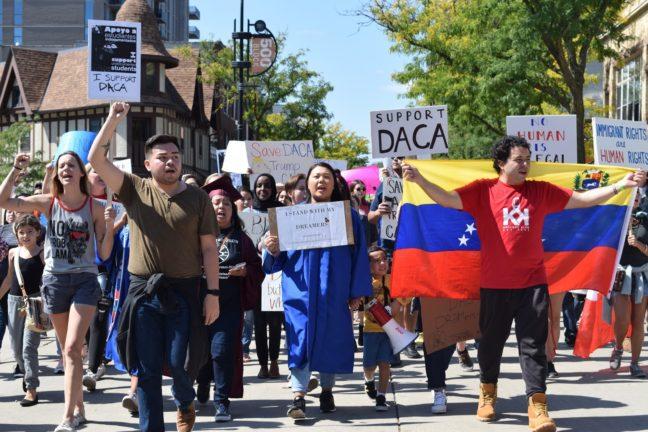With increasing uncertainty around the safety and security of undocumented students at the University of Wisconsin, the Faculty Senate will vote in April on the formation of a new standing committee representing the needs of international and immigrant students.
When President Donald Trump decided to end the Deferred Action for Childhood Arrivals program in Sept. 2017, Vice Provost and Dean of the International Division Guido Podestá said he convened an advisory committee to look at the pressing issues facing UW’s undocumented and international students at Chancellor Rebecca Blank’s request.
As the national debate surrounding immigration continues, the chancellor and other university leaders have recognized the need for a standing chapter VI committee to advise and provide recommendations to university administrators on issues of immigration policy, DACA, travel, safety and security confronting students, staff and faculty, and the university, Podestá said in an email to The Badger Herald.
Chair of the Faculty Senate’s University Committee Anja Wanner brought the proposal for the formation of the Immigration and International Issues Committee to the Faculty Senate on March 6. Wanner said the proposal will most likely pass when it comes up for a vote in April.
“It has been unanimously supported,” Wanner said. “Everything that I’ve heard, people have been very much on board.”
Unless the proposal is altered before April, the committee will count as members students, faculty, academic and university staff, as well as a number of ex-officio, nonvoting members.
These nonvoting members will consist of directors at four respective university institutions — International Students Services, International Faculty and Staff Services, the Multicultural Student Center and the Immigrant Justice Clinic — as well as Podestá in his position at the International Division.
Podestá said he will both participate in discussions and consider recommendations that come out of committee meetings. Other ex-officio members will similarly take conversations and advice formed within the committee and apply them within their respective institutions.
“UW–Madison is an incredible place, in large part because of the fascinating ideas and perspectives that students, faculty, and staff share within our community,” Podestá said. “I hope that the ideas that will come out of this committee further enable the dialogue and collaboration that have caused UW–Madison to be recognized as a top global university.”
Though DACA was slated to end on March 5, court injunctions stalled its termination, keeping thousands of undocumented young people from losing their temporary status. Of the 800,000 DACA recipients, around 7,600 live in Wisconsin.
But the security and safety of DACA recipients are still in limbo and students at universities across the U.S. must contend with increasing numbers of barriers and stressors as they attempt to get their degrees.
At a press conference on March 5, UW sophomore Rafael Martinez spoke to a room of city leaders, Latinx advocates and reporters about his experiences as an undocumented student.
Martinez said his parents moved his family to the U.S. when he was two years old for economic reasons and has lived in Madison ever since, all the time wanting to attend UW and get a degree in education.
But because the Wisconsin State Legislature revoked eligibility for in-state tuition for undocumented students in 2011, Martinez, a life-long Madisonian must pay the out-of-state tuition of $34,000 a year.
“I also have to continually work, not one job, not two jobs, but three jobs pretty much at the same time,” Martinez said. “I have to maintain that focus both academically and within my family and with my friends and everything.”
The Director of the Asian American Studies Program Cindy Cheng was one of the most influential voices in the formation of the committee, Wanner said. Cheng, who came to UW from Los Angeles, implemented pioneering ideas and policies used at universities in L.A. to create UW’s committee.
Wanner said any policy that comes out of the committee will add needed stability for undocumented students at UW. The first tangible success for the committee is a new dedicated staff person in charge of questions surround undocumented status.
Wanner, a green card holder from Germany, said she is nervous about her own security in the U.S. even with permanent legal status.
“I cannot imagine how nervous people are who have spent their whole lives in this country,” Wanner said. “Whatever we can do, we must do.”
Martinez said he has received “despicable” remarks from people online and in person disparaging him as an immigrant, adding to mounting levels of stress from economic and legal insecurities.
But Martinez added he is hopeful of what city leaders and citizens’ solidarity can accomplish.
“More than anything, the solidarity that we are able to create, that change is going to come,” Martinez said.


